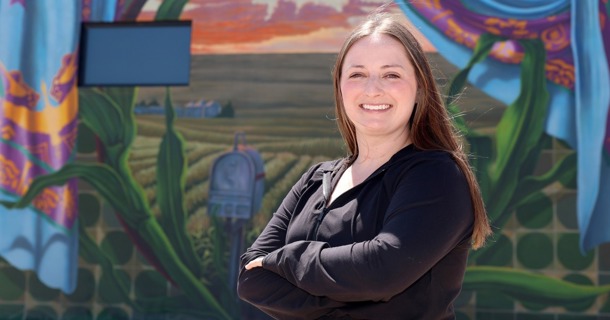Shared Solutions: UNK program builds statewide partnerships to strengthen, expand early childhood education

Jill Austin always knew she’d find her way back to Valentine.
Raised in the north-central Nebraska community, Austin returned seven years ago so her children could grow up in the same place that shaped her upbringing. She’s not alone in that choice.
“Young families are moving back because they want their kids to have the same kind of childhood they had,” said Austin, executive director of the Valentine Children and Families Coalition. “In a small town, everybody is there to help everyone. And Valentine is a very forward-thinking community – we have new restaurants and businesses coming in – so that helps drive this growth.”
That sense of community pride and commitment to the next generation is what drives Austin’s work. Her coalition supports early childhood providers across Cherry County, focusing on innovative partnerships and expanding access to child care. The nonprofit recently raised $100,000 to open a child care facility in the basement of an Episcopal church –just one example of their creative, community-led approach.
Still, access to child care and early education remains an obstacle.
“We need more providers, for sure,” Austin said. “I would say we’re probably at a 40-kid deficit right now. We want people to move to our community, and we want to continue growing, but people won’t move back if there’s no child care or no housing. So, we must keep thinking outside the box to recruit and retain rural providers.”
That’s why Valentine joined the Knowledge Network for Early Childhood Education Workforce (KNEW), a statewide initiative that brings together stakeholders from 17 rural communities and counties to address the recruitment and retention of early childhood educators in Nebraska.
Led by the University of Nebraska at Kearney, along with Communities for Kids and Nebraska Extension, the program launched last fall with $2 million in funding from the U.S. Department of Education.
“We’re a pillar community for Communities for Kids, so it seemed like a natural fit,” Austin said, referencing the nonprofit initiative with more than 70 partners across the state. “It was a really easy transition into the KNEW program, and it was a really easy sell to our providers, as well.”
CRITICALLY IMPORTANT WORK
A first-of-its-kind program, KNEW uses a collaborative approach to enhance and expand the early childhood workforce. The two-year federal grant enables early childhood professionals, community leaders, business partners and researchers to work together to strengthen local infrastructure and build long-term solutions that support both providers and families.
“The primary goal of the KNEW project is to strengthen the recruitment and retention of early childhood educators in rural Nebraska,” said Philip Lai, an associate professor in the UNK College of Education and the project lead. “This work is critically important due to a concerning downward trend in both the availability and quality of early childhood care and education across the state.”
According to a 2023 report from the nonprofit Voices for Children in Nebraska, 84 of the state’s 93 counties do not have enough licensed child care spots to meet the potential demand. Nine of those counties were classified as “child care deserts,” with no licensed child care available for families living there.
Another survey from Nebraska Extension and We Care for Kids shows that almost a third of parents with children ages 5 and younger left the workforce because they couldn’t find affordable child care, and 74% of respondents believe a lack of quality, affordable child care and early learning is a serious problem in Nebraska.
“In recent years, increasing vacancies in child care centers have created significant challenges for families,” Lai said. “When children lack access to enriching early learning environments, their development can be compromised. At the same time, parents without reliable child care may struggle to maintain stable employment, which in turn affects local businesses and the broader state economy.
“The bottom line is clear: without access to quality child care, families may be forced to leave their rural communities in search of better opportunities – resulting in a loss of workforce, community vitality and economic resilience.”
Through research, professional development and community-based solutions, the KNEW program is already making a difference.
The project team launched an online course offering resources for child care providers to strengthen their practice and career development, and statewide gatherings provide opportunities for participants to build partnerships and grow their professional networks. Funding is also available to support professional development and training programs at the local level.
The research group, which includes Lai and fellow UNK College of Education faculty members Sharon Obasi, Paula Thompson and JP Rech, will complete a study involving more than 200 participants from rural Nebraska communities, allowing them to better understand the early childhood education workforce landscape.
By exploring the social and professional networks within each community, the KNEW team hopes to identify the factors that support long-term sustainability – and scale those successes statewide.
“Our goal is to develop shared strategies and best practices that rural communities can use to improve early childhood education and increase access to child care across Nebraska,” said Thompson, an associate professor in the UNK College of Education. “By gaining a deeper understanding of these communities – what is working and what barriers still exist – we can build an infrastructure for sustainable services that benefits children, families, businesses and communities for years to come.”
COMMON THEME
Although it’s located more than three hours away, on the opposite side of the state, the community of Holdrege shares a lot of similarities with Valentine.
McKenna Fahrenbruch, a Colorado native, moved there about six years ago to experience small-town life in rural Nebraska. Like Austin, she discovered that she’s part of a larger trend.
“Holdrege and Phelps County are seeing a lot of growth. We have an amazing hospital and thriving businesses, so a lot of young families are interested in moving here,” Fahrenbruch said. “The goal now is to make sure we’re building that child care capacity as our community continues to grow.”
“If we don’t have child care, then we can’t have nurses and we can’t have people working at these businesses and keeping them going. It impacts the whole community,” she added.
A former kindergarten teacher, Fahrenbruch serves as director of the Holdrege Area Early Childhood Partnership, a nonprofit formed last fall. She works closely with local providers, families and businesses to improve the quality of early education, increase access and strengthen the overall child care system.
Four providers from her community are participating in the KNEW project, and Holdrege is also a Communities for Kids partner.
“The need for providers right now is huge,” she said. “We definitely need more providers in our community. We also need more people who are willing to work at these child care centers. A lot of our centers in Holdrege are not functioning at full capacity because they don’t have enough staff.”
Fahrenbruch, who earned her master’s degree from UNK, believes an important step is reshaping how people view the profession.
“We want our providers to see themselves as business owners and professionals – not just child care providers,” she said. “We want them to take pride in their work and keep educating themselves so they can provide the best-quality care.”
Fahrenbruch and Austin are both excited about the collaborative aspect of the KNEW program, giving them an opportunity to compare notes, share ideas and learn from each other.
“I think it’s going to give us a lot of good data that we’ve been seeking for a long time,” Fahrenbruch said. “This is information we can bring back to our community and use to make improvements moving forward.”
Eventually, the research findings will be shared through academic publications, conference presentations and other professional forums, extending the program’s reach far beyond Nebraska’s borders.
“We want to ensure that the knowledge gained benefits not only Nebraska but also other states facing similar early childhood education workforce shortages,” Lai said.
